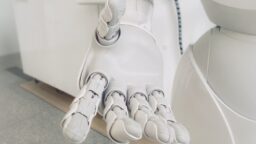-
For Climate Change Opinions, People Trust Their Neighbors
Neighbor see, neighbor do. People are more likely to believe in human-caused climate change if they see that the people living next to them do, a new study finds. “People are learning from their neighbors,” said Andrea La Nauze, a co-author of the study and assistant professor in the University of Pittsburgh’s Department of Economics.… Read More
-
Could AI Make Internet Trolls a Thing of the Past?
The age of the internet troll may soon come to an end, as researchers at Caltech and Stanford have laid the groundwork for an effective AI tool that social media networks could eventually use to flag online hate speech and harassment. This is particularly important today, as many believe a rise in hateful rhetoric online… Read More
-
Osteopathic Medical Students Show Low Rates of Burnout
With medical school comes notoriously long, stressful, work-filled days. Yet, students studying osteopathic medicine show surprisingly low rates of burnout, a new study finds. Burnout, a state of mental and physical exhaustion caused by prolonged exposure to stressful work, is a problem in many fields but is particularly high among those in medicine. Until this… Read More
-
How to Ace the Entry-Level Lecture Course
Entry-level lecture courses, such as “Introduction to Philosophy” or “General Psychology,” may sound simple. But don’t be fooled. Such courses are deceptively tricky and many students struggle to pass them. Historically, about 15 percent of students who take 100-level lecture courses at large public universities, where they are most common, get Ds or Fs or… Read More
-
College Students Are Bridging Cultural Divides
College is more than just about the academics. New research suggests that the friendships students make on campus could play a key role in repairing the rampant social, religious and political divides in the United States. Cultural empathy, the study finds, is facilitated through friendships. And college campuses are ideal for cultivating diversity in friendships. … Read More
-
Stanford Researchers Suggest a Better Way to Diagnose Mental Illness
Due to increased rates of clinical depression and other mental health problems, suicide is now the leading cause of death in young people ages 15-24 — more than all other diseases combined. The numbers are notably grim among college students. Currently, 36 percent of college students qualify as depressed, 31 percent have moderate to severe… Read More
-
7 Proven Ways Students Can Set and Keep a New Year’s Resolution
Have you made a New Year’s resolution? More than 90 percent of people do, many of whom are college students. But when it comes to fulfilling resolutions, the numbers are grim. Only 20 percent of people keep theirs past the second week of February. If you have a plan, though, following through on a resolution… Read More
-
66% of College Democrats Support a Universal Basic Income
Two-thirds of college Democrats support a universal basic income such as that proposed by presidential candidate Andrew Yang, which would give $1,000 a month to every American over the age of 18, according to a new College Pulse survey of 2,000 students. A universal basic income is not as popular among Republican students, though, as… Read More
-
To Lower Your Carbon Footprint, Red Meat Isn’t the Only Food You Should Avoid
For a sustainable diet, it’s not enough to just avoid red meat. A new study finds that the families with the highest carbon footprints are those that frequently eat out and consume a lot of alcohol and sweets. To come to this conclusion, researchers from the University of Sheffield in the UK and the Research… Read More
-
Your Social Media Habits Can Match You with Your Perfect Career
Finding a job that fits your personality and interests is easier said than done. And for college students stepping into their freshman or sophomore year, picking a career field is undeniably packed with pressure. It could soon become much easier, though, as new research suggests social media habits can be used to predict someone’s personality… Read More
-
A Pricey Tuition Doesn’t Always Indicate a Good Education
It’s cold outside. And for high school seniors, parents and college counselors, this time of year isn’t only about the holidays. December also marks the peak of college application season, as January deadlines are soon approaching. But, while seniors make their final college decisions, it’s important for them to remember that picking a college isn’t… Read More
-
Why Inequalities Resurface When Students Earn Advanced Degrees
There’s a long-standing belief that college is “the great equalizer.” For students from low-income families, it’s seen as their way out of intergenerational poverty. To a certain extent, that’s true. But only when comparing students with a bachelor’s degree. Once students go on to earn more advanced degrees, wealth-based inequalities reemerge, as those from low-income… Read More
-
Students Who Are Better at Managing Their Emotions Earn Higher Grades
Students know many factors can affect the grades they earn, including their natural intelligence, how hard they work, their test-taking skills, their sleep habits and even their diet. But new research suggests there’s another component to academic success — emotional intelligence. Students who are better able to understand and manage their emotions earn higher grades,… Read More
-
How Colleges Advance Environmental Sustainability in Their Greater Communities
With the United Nations warning that humanity has less than 11 years to prevent climate change from causing irreversible damage to the planet, immediate and accelerated climate action is necessary. The upcoming decade is “the most pivotal decade in human history,” said Fiona Wilson, the director of the Sustainability Institute at the University of New… Read More
-
Americans Are Relying on News They Know Isn’t Trustworthy
Despite years of educating people on the dangers of fake news and encouraging them to seek out accurate stories, a third of Americans are still willingly relying on sources that they know are less than trustworthy, such as social media and peers, for their news. That’s the key takeaway from a RAND Corporation report meant… Read More

Jackson Schroeder
-
How to Ace the Entry-Level Lecture Course
Entry-level lecture courses, such as “Introduction to Philosophy” or “General Psychology,” may sound simple. But don’t be fooled. Such courses are deceptively tricky and many students struggle to pass them. Historically, about 15 percent of students who take 100-level lecture courses at large public universities, where they are most common, get Ds or Fs or… Read More















